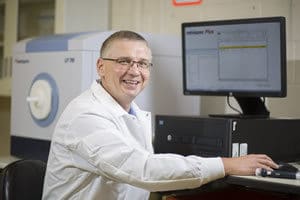Dr. Czaja’s Lab
“If you limit your choices only to what seems possible or reasonable, you disconnect yourself from what you truly want, and all that is left is a compromise.” …Robert Fritz
TEDxPeachtree – Why Diets Fail
Bio

Dr. Czaja
Krzysztof Czaja, Associate Professor BMSC, received his D.V.M. in 1993 from the Veterinary Medicine College, Academy of Agriculture and Technology, Olsztyn, Poland. He received his Ph.D. in Neuroanatomy from the University of Warmia and Mazury, Olsztyn, Poland in 1997. From 1997-2007 he did postdoctoral work at the University of Warmia and Mazury, Olsztyn, Poland; the Institute for Plastination, Heidelberg, Germany and United States Department of Agriculture, Animal Physiology Research Unit, Athens, GA, USA. In 2007, he was appointed to the faculty as an Assistant Professor at Washington State University, Pullman, WA, USA. He was promoted to Associate Professor in 2014. In 2015, Dr. Czaja joined the Veterinary Biosciences & Diagnostic Imaging Department at University of Georgia in Athens. Dr. Czaja is an author of 50 peer-reviewed publications and has been invited to give numerous presentations and symposia.
Research
Imagine a future where neurosurgeons could implant new neurons into damaged areas of the brain or replace neurons lost to aging, or even enhance areas of the normal brain. I let this future begin today by investigating the biology of postnatal neurogenesis in vitro and in animal models utilizing technologies in cell biology, molecular biology and histology.
Some spontaneous generation of new neurons occurs in the adult mammalian nervous system. However, the addition of new neurons and replacement of damaged neurons is very limited. Therefore, identification of neuronal populations that can be stimulated to proliferate and differentiate into viable neurons is one of the major challenges for developing therapeutic strategies to repair neurological damage. Recently, we discovered that neurons of the viscerosensory nodose ganglia in adult rats proliferate, following systemic treatment with capsaicin, the active component of chili peppers. These data suggest that the nodose ganglia, and perhaps other primary afferent ganglia, may provide a model system for examining neurogenesis in the adult animal, and perhaps it could provide a source of neurons or precursors for autologous treatment of neurological injuries.
According to the CDC more than one-third of U.S. adults (35.7%) are obese and by 2030 this number will exceed 50%. Obesity related conditions include heart disease, stroke, type 2 diabetes and certain types of cancer, some of the leading causes of preventable death. In 2008, medical costs associated with obesity were estimated at $147 billion; the medical costs for people who are obese were $1,429 higher than those of normal weight. Our laboratory is investigating brain plasticity following Roux-en-Y gastric bypass (RYGB), the most effective method to achieve major, long-term weight loss. Specifically, we try to establish the role of the vagus nerve in the mechanism of RYGB. This information may suggest treatments for obese individuals that would be less radical than surgery. Moreover, establishing the role of brain reorganization in taste alterations may allow the development of novel therapies that can mimic the effects of RYGB surgery. Results of our studies may serve as the foundation for breakthroughs in obesity treatment.
Czaja Lab In the News
- http://time.com/5360407/microbiome-diet-gut-health/
- http://www.eurekalert.org/multimedia/pub/52444.php
- http://www.klewtv.com/news/local/NFL-awards-100000-grant-to-continue-concussion-research-at-WSU-190759781.html
- http://www.science20.com/news_articles/high_fat_diets_linked_to_gut_microbe_changes-156464
- http://www.huffingtonpost.com/entry/how-a-high-fat-diet-may-be-screwing-with-your-brain_55a417d7e4b0ecec71bcb352
- http://www.sciencedaily.com/releases/2015/07/150707212451.htm
- http://onlineathens.com/uga/2015-07-16/key-diet-failure-success-might-be-bacteria-our-guts
- http://qz.com/447305/why-you-cant-just-eat-one-french-fry-or-piece-of-pizza-or-donut/
